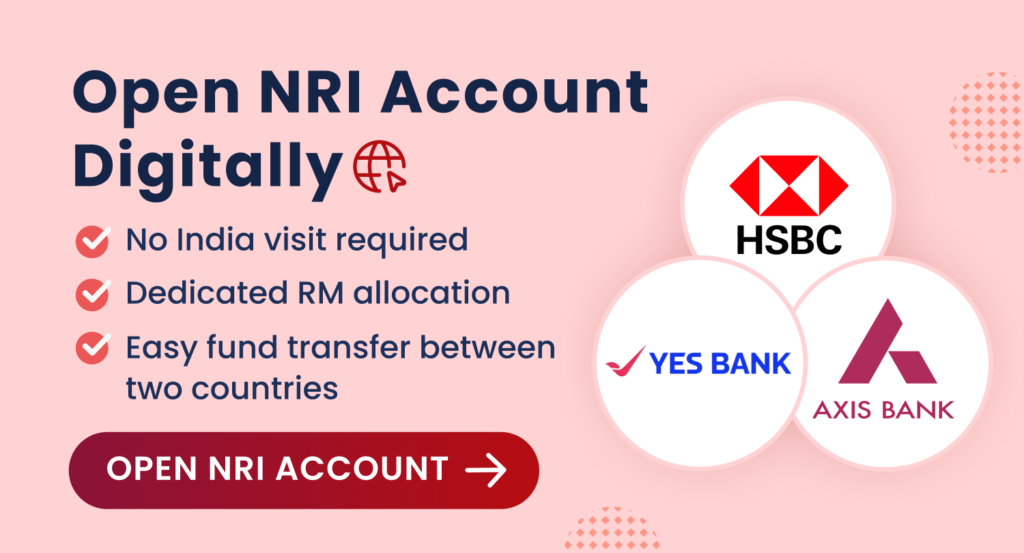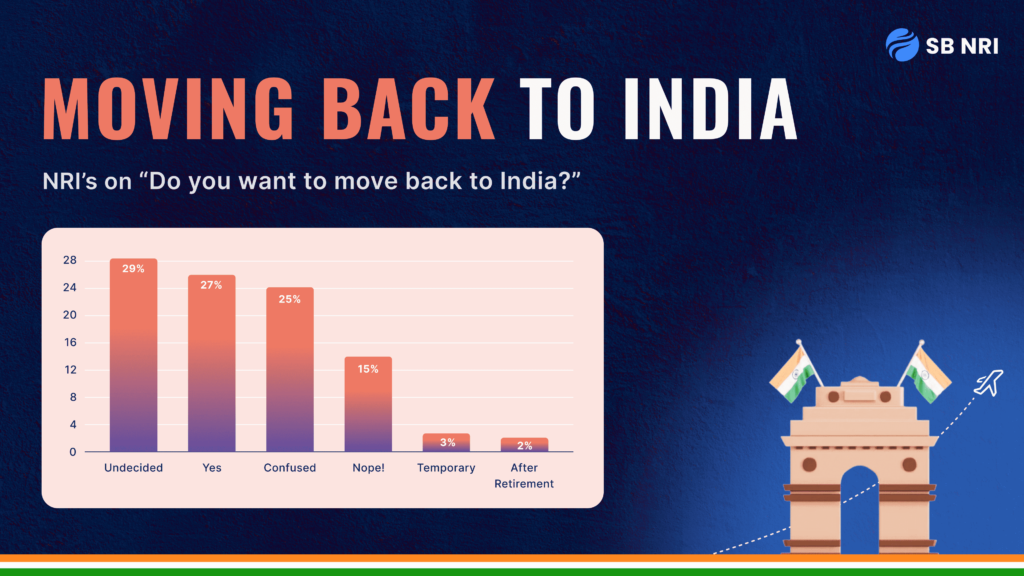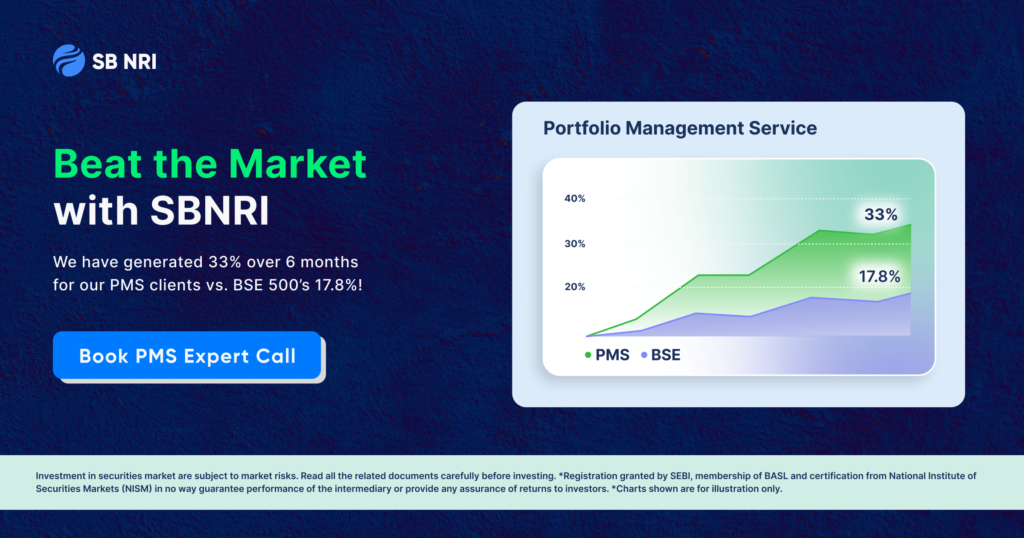
Welcome to our guide on the “Best NRI Investments in India 2024.” If you’re a Non-Resident Indians (NRIs) or an Overseas Citizen of India(OCI) looking to make smart financial moves in India, you’re in the right place. This blog will break down the top investment options, making it easy for you to navigate and choose what suits you best. Whether it’s mutual funds, real estate, fixed deposits, we’ve got you covered. Let’s explore together the best NRI/OCI investment opportunities in India for 2024, ensuring you make informed choices and maximize your returns in the ever-evolving financial landscape.
Quick Learn: Who is an NRI investor?
To understand NRI investment in India, it is important to determine that an individual investor is an NRI. An NRI (Non-Resident Indian) is someone who is a citizen of India but not a resident of India i.e. is now living outside India. Residential status of an individual, whether a resident or non-resident, is determined under Section 6 of the Income Tax Act.
As per Section 6 of ITA, a citizen of India is considered to be an NRI if he/she is not a resident of India, and an individual is deemed to be an Indian in any previous year if he/she meets any of the following criteria:
- If an individual resided in India for a period of 182 days or more during the previous year; or
- If he/she lived in India for a period of 60 days or more during the previous year and 365 days or more during 4 years immediately preceding the previous year.
An Indian citizen who does not meet the above-mentioned criteria is considered a non-resident Indian or NRI. However, the rules to determine the residential status of an individual change over time. Hence, you must be aware of new rules for NRIs.
Non-Resident Indians can explore one or many of the investment opportunities described below.
Best Investment Options for NRIs in India 2024
While there are various best investment plans for NRIs to invest in India, it is not easy to sort out the best options for them. With some restrictions, investment plans for NRIs in India are more or less similar to those for resident Indians, provided they follow guidelines set by the RBI, FEMA, and SEBI, and laws enacted by the country of their residence. Knowing about NRI investment options in India and the rules that may apply will help you make the right investment choice.
In such situations, it is important to find an ideal NRI investment option that provides complete financial security and attractive returns. Some of the best investment options include secondary market equity shares, mutual funds, NRI fixed deposits, bonds, commercial real estate, pre-IPO, micro VC funds, etc.
Schedule a call with an NRI investment expert to get complete help regarding investment in India.
Also read: Best SIP to Invest in 2024 – Top 10 SIP Mutual Fund Plans for NRIs/OCIs
10 Best NRI Investment Options in India 2024
Before investing in India, you need to find the perfect investment option that will offer the maximum possible returns. You need to consider some important points including investment plan, NRI account for investment, investment appetite, and applicable taxes.
Here are the 10 best investment options in India for NRIs with varied investment goals.
- NRI Fixed Deposits
- NRI Investment in NPS (National Pension Scheme)
- NRI Investment in Equity
- NRI Investment in Mutual Funds
- NRI Investment in Real Estate
- NRI investment in Public Provident Fund
- Bonds and Non-Convertible Debentures (NCDs)
- Pre-IPO investment
- Portfolio Management Services
1. NRI Fixed Deposits

Fixed Deposits are the most common investment options among NRIs. FDs are one of the safest ways to invest and earn fixed income over a predefined period. There are three types NRI Fixed Deposit Accounts:
- Non-Resident External (NRE) Account
- Non-Resident Ordinary (NRO) Account
- Foreign Currency Non-Resident (Bank) [FCNR(B)] Account
Let’s understand these NRI fixed deposit accounts:
- Non Resident External (NRE) Fixed Deposit: NRE FD accounts are opened by NRIs to deposit their foreign earnings in Indian rupees. NRE FD account interest rate ranges from 2.75% to 7% p.a. The interest earned in an NRE account is tax-free in India but may be taxed in your country of residence. Both the principal as well as the interest earned can be fully repatriated.
- Non Resident Ordinary (NRO) Fixed Deposit: NRIs can open an NRO Fixed Deposit account to maintain and save their income generated in India, such as dividends, rental income, pension, etc. You can earn up to a 7.30%* interest rate on these accounts. Interest earned on the funds is taxable in India at 30% along with surcharge and cess.
- Foreign Currency Non-Resident (Bank) [FCNR(B)] Fixed Deposit: An FCNR (B) fixed deposit account allows NRIs to deposit funds in a foreign currency in India, such as USD, GBP, EUR, JPY, AUD, CAD, SGD, HKD, and others. You can deposit money for different terms, like 12 months, 24 months, 36 months, 48 months, or 60 months. An FCNR account helps NRIs avoid currency fluctuation. FCNR FD interest rates vary based on the currency. The interest income is not taxable in India and both the principal amount as well as the interest are completely repatriable.

2. NRI Investment in NPS (National Pension Scheme)
National Pension Scheme or NPS could be one more reliable source of investment for NRIs in India. NPS scheme is fully backed by the government and allows NRIs to invest in equity funds, debts, or a combination of both.
Individuals between the ages of 18 years and 60 years can invest in NPS with minimal documents like PAN card and Aadhaar card. You need a Non-Resident External (NRE) account or Non-Resident Ordinary (NRO) account when investing in NPS.
You can go for one of the following options under the National Pension Scheme for NRIs.
Active Choice
In active choice, the asset is allocated between:
- Equity
- Corporate bond
- Government Securities
Up to 75% can be contributed in equity.
Auto Choice
As the name suggests, assets are allocated automatically and can’t be decided by the investor. Asset allocation depends on the age of the NRI applicant.
Tax Benefits of NPS investment: An NPS is not exempt from tax. The capital gains are not taxed but all payouts are taxed as per your tax slab based on your Indian income is classified.
The Subscriber is free to manage the frequency and amounts of contributions. There are two types of Accounts under NPS:
- Tier 1: Money in this account is locked until retirement. If you retire before the age of 60 you may take 20% of the investment as cash (tax-free). The remaining 80% is invested into an annuity (an investment that pays you a fixed yearly amount). If retiring after 60, then a minimum of 40% must be annuitized and the balance can be withdrawn lump sum (tax-free).
- Tier 2: Only tier 1 account holders are allowed to open a tier 2 account. Tier 2 accounts allow you to deposit and withdraw money as you wish. There are many types of investments that you can choose from (Equities, Corporate Bonds, Government Bonds etc.) also referred as (E, C & G) to help you to create an effective investment strategy.
Note: You can withdraw the corpus amount if it is lesser than INR 2 lakhs.

3. NRI Investment in Equity
NRI investors who are ready to take some risk in the stock market can consider investing in equity. Non-Resident Indians can directly invest in the stock market in India under the Portfolio Investment Scheme (PIS) of the RBI.
NRIs need to have the following accounts for equity investments:
- Non-Resident External (NRE) Account
- Non-Resident Ordinary (NRO) Account
- NRI Demat Account
- NRI Trading Account with a registered broker
Dividend income and the capital gains earned by NRIs from shares and equity-oriented schemes of mutual funds are taxed in India. Find the capital gains tax on shares purchased by NRIs.
4. NRI Investment in Mutual Funds
Mutual funds can be an ideal option for NRIs with limited knowledge and understanding of the Indian market. Mutual funds can offer much higher returns than bank FDs. There are several NRI mutual fund schemes in India.
Just like resident Indians, NRIs can also invest in mutual funds in India, but there are only a few AMCs that offer mutual funds for NRIs based in the USA and Canada. NRIs living in USA and Canada are faced with certain tedious compliance requirements under FACTA to invest in mutual funds in India.
As compared to fixed deposits or national pension schemes, mutual funds are a little riskier but offer more attractive returns. NRIs can select funds according to their risk profile and future goals.
Also read: 10 Mutual Funds That Doubled Wealth In 5 Years
How can NRI invest in Mutual Funds in India?
To invest in mutual funds in India, you need to fulfill FEMA guidelines for being an NRI. Some key points for NRI investment in mutual funds are as follows:
- Investment can be made through Non-Resident External account or Non-Resident Ordinary account
- Investment is possible in Indian National Currency (INR) only and not in a foreign currency
5. NRI Investment in Real Estate
A long-term investment option with steady growth, real estate is a decent source of investment. NRIs can easily buy property in India and rent it out for extra income. It offers good long-term returns along with steady growth over a period.
What properties can NRIs buy in India?
NRIs are allowed to purchase both residential and commercial properties in India. Because of high rental yields and outperforming returns, non-resident Indians are eyeing commercial real estate in India. NRIs can invest in commercial properties through fractional ownership with a minimum of Rs. 25 lakh investment. However, they can not buy any Agricultural Land, Farm House or Plantation property. They can only be inherited or received as gifts.
NRIs can use the following bank accounts to buy or sell a property in India:
- Non-Resident External Account
- Non-Resident Ordinary Account
Ask SBNRI Real Estate Expert Now
6. NRI investment in Public Provident Fund
An NRI can continue with his/ her PPF account which they opened as a resident Indian. However, if an NRI doesn’t have a PPF account, she/ he can’t apply for the same with non-resident status. NRIs can’t extend their PPF account after the maturity period of 15 years.
7. Bonds and Non-Convertible Debentures (NCDs)
NRIs can invest in bonds and non-convertible debentures (NCDs) in India. NRIs are now eligible to invest in government securities in the form of bonds for NRIs in India without any ceiling limit in certain securities.
Three main bond categories are as follows:
- PSU Bonds: Under PSU bonds, investors lend money to a company and they promise to repay the loan with interest on a specific date (maturity date). The interest on PSU bonds are determined depending on the creditworthiness of the company that issues it. The NRI investor doesn’t get any tax exemption, but the interest earned is tax-free U/S 10 (15) (IV) (h). If you sell them after owning them for more than 3 years, the investment is taxed @ 20%. NRIs can also claim tax deductions if they invest in capital gain bonds by REC and NHAI under section 54 EC.
- Non-Convertible Debentures (NCD): NRIs can invest in non-convertible debentures (NCDs) for a secure and long-term investment. They are secured by the company’s assets. Interest rate is a bit lower than unsecured debt as the risk involved is less.
- Perpetual Bonds: There is no fixed maturity date for these bonds. However, the issuing company promises to pay the investor a set amount of returns per year. Perpetual bonds are traded in the open market. The present market conditions and holders’ willingness to sell will determine if they make a profit by selling the investment.
8. Pre-IPO investment
Pre-IPO can be an attractive investment option for NRIs. In pre-IPO markets, people buy and sell shares of a company that is yet to be listed on a public exchange. Private companies sell their shares through an intermediary i.e. an investment firm that can help you successfully close the transaction.
When an NRI buys unlisted shares, the units will be deposited in your NRI Demat account. Pre-IPO shares provide massive opportunity for growth but the investment in such assets is riskier because they are less regulated. Hence, it is crucial to find a trusted intermediary.
9. Portfolio Management Services

In Portfolio Management Services (PMS), fund managers manage the portfolio on behalf of the investor by making investment decisions based on their investment goals, risk tolerance, and investment horizon. PMS provides investors with personalized investment solutions tailored to their specific needs. You can start investing in PMS with Rs. 50 Lakhs.
Also read: PMS for NRI: A Comprehensive Overview
Benefits of Investing in PMS
Following are the benefits of investing in portfolio management scheme for NRIs:
- PMS is managed by experienced and qualified fund managers who have in-depth knowledge of the market and the economy. These fund managers use their expertise to make informed investment decisions on behalf of the investors.
- It provides personalized investment solutions tailored to the specific needs of individual investors. The investment portfolio is customized based on the investor’s risk profile, investment goals, and investment horizon. This allows investors to have a diversified portfolio of assets that are aligned with their investment objectives.
- PMS provides investors with exposure to a diverse range of asset classes. This diversification can help reduce the overall risk of the portfolio and provide investors with better risk-adjusted returns.
- This investment option provides investors with regular reports on the performance of their portfolio. Investors can monitor the portfolio’s holdings and transactions through an online portal.
Also read: AIF vs PMS: What is the Difference?
Because of the rapid industrial development over the past two decades, India is attracting massive foreign direct investment (FDI). A spurt in NRI investment in India has been seen in recent years.
Best Investment Options in India for NRIs: Why should NRIs Invest in India?
There are several reasons why NRIs should consider investing in India:
- The Value of Currency: Despite the rapid growth of the Indian economy in recent decades, the rupee has seen a steady decline in value compared to other currencies. This translates to the potential for better returns on your investments.
- Diversification: In addition to geographical diversification, NRIs have the opportunity to diversify their portfolio by investing in various asset classes such as equity funds, debt funds, liquid funds, stocks, and more, spanning different sectors and industries.
- Better Interest Rates: Indian banks typically offer higher interest rates compared to countries like the US, Australia, Japan, China, and Saudi Arabia.
- Retirement: Setting up a retirement plan through investments in mutual funds, stocks, or real estate is easier and more cost-effective in India
How to Invest in India as an NRI or OCI?
NRIs can now download the SBNRI App and choose to invest in different investment options in India with ease. You can also get detailed investment advice from experts at SBNRI. Also, visit our blog and YouTube channel for more details.
SBNRI is an authorized Mutual Fund Distributor platform & registered with the Association of Mutual Funds in India (AMFI). ARN No. 246671. NRIs willing to invest in mutual funds in India can download the SBNRI App to choose from 2,000+ mutual fund schemes or can connect with the SBNRI wealth team to better understand Mutual Fund investments.
FAQs
A- Yes. NRIs can invest in Indian Stock Market by buying stocks listed on the National Stock Exchange of India Ltd. (NSE). To be eligible to invest into stocks, NRIs need to have a PIS Account under the Portfolio Investment Scheme* (PIS) that will allow them to trade stocks. *(Portfolio Investment Scheme (PIS): Through this scheme of the Reserve Bank of India, NRIs can purchase and sell shares and debentures of Indian companies on a recognized stock exchange)
Yes, NRIs can use a PAN card and NRE/NRO account to invest in a mutual fund. To invest in shares, NRIs need an NRE account under PIS bank or NRO account, bank account and Demat account.
A- Yes. An NRI can have multiple demat accounts. The usage of these multiple demat accounts can be understood under the concepts of:
1. Repatriation: NRIs must have separate demat accounts for repatriable (NRE) and non-repatriable (NRO) shares which means if you invest through your NRE account, the money you receive after selling the shares/stocks is completely and freely repatriable whereas investments through NRO accounts will have to be initially settled by paying applicable taxes and then they can be repatriated. NRE accounts are used to buy shares (equity) on a repatriable basis and NRO accounts are used to invest in shares (equity and derivatives) on a non-repatriable basis. The NRE/NRO Accounts can be used to invest in the primary market without PIS (Portfolio Investment Scheme) (eg: IPOs, Mutual Funds)
2. Market Variation: In order to invest in the secondary market you need a separate bank account to hold your investment funds that will be linked to the Portfolio Investment Scheme (PIS). This account can not be your regular NRE/NRO account and this account will be linked to a demat account to hold your shares as directed by RBI.
A- No, PIS permission is not required for an NRO (Non-Resident Ordinary) account. Previously, the NRI had to open NRE and NRO accounts under PIS regulated by RBI.
A- Yes. An NRI can invest in property in India but there are exceptions. Though RBI has given general permission to the NRIs to purchase immovable properties in India, the permission does not grant power to acquire any and every property in India. The NRIs are allowed to purchase only residential or commercial property. So NRIs cannot purchase any agricultural land or plantation property.
A-Yes, NRIs can have a Public Provident Fund (PPF) and invest in it. However, an NRI can open a PPF account when he/she was a resident Indian.
A-Yes, there are a few tax-free options available in India for NRIs like NRE FD Account, FCNR FD Account, ELSS Funds, and Life Insurance.
Here are the steps an NRI can follow to invest in India:
1. Open an NRE or NRO (Non-Resident Ordinary) bank account: NRIs need to open an NRE or NRO bank account with an Indian bank to invest in India. An NRE account is used for investing foreign earnings that can be repatriated, while an NRO account is used for investments made from earnings in India that cannot be repatriated.
2. Obtain a Permanent Account Number (PAN): NRIs need to obtain a PAN card to invest in India. This card is required for opening a bank account, investing in the stock market, and purchasing property in India.
3. Complete KYC norms: NRIs need to complete the KYC (Know Your Customer) norms by submitting the necessary documentation such as a copy of their passport, address proof, and PAN card.
4. Choose an investment option: NRIs can choose to invest in various options such as stocks, bonds, mutual funds, real estate, and more. NRIs can also invest in the Indian stock market through the Portfolio Investment Scheme (PIS).
5. Ensure compliance with regulations: NRIs need to ensure compliance with all applicable regulations and laws when investing in India.
However, it’s recommended that NRIs consult with a professional financial advisor or tax consultant to ensure compliance.
Given below are the benefits of investing in India for NRIs:
1. Diversification: Investing in India can provide NRIs with a diversification option outside of their home country. This diversification can help to minimize the overall risk in their investment portfolio.
2. High Growth Potential: India has a growing economy with many investment opportunities. With the rise of the middle class and increasing urbanization, there is a lot of potential for growth in various sectors such as real estate, infrastructure, and manufacturing.
3. Favorable Demographics: India has a young population, and with increasing disposable incomes, there is a significant demand for various products and services. This demographic advantage provides a huge potential for businesses and investments in the country.
4. High Returns: Historically, Indian investments have provided high returns to investors. The Indian stock market has outperformed many other markets over the past few decades, and there are many sectors that have the potential for high returns.
5. Tax Benefits: NRIs investing in India can take advantage of various tax benefits. For example, NRE accounts are tax-free, and NRIs can benefit from the Double Taxation Avoidance Agreement (DTAA) between India and their home country.
6. Repatriation of Funds: NRIs can repatriate the funds invested in India along with the profits earned from the investment, subject to certain conditions.
Here are some popular government investment schemes for NRIs in India:
1. National Pension Scheme (NPS): NPS is a retirement savings scheme launched by the government of India. NRIs can also participate in this scheme, and contributions made to the scheme are eligible for tax deductions.
2. Sovereign Gold Bonds: Sovereign Gold Bonds are issued by the government of India and provide a secure investment option for NRIs. The bond’s value is linked to the price of gold, and the investment can be redeemed after a fixed period of time.
3. Pradhan Mantri Jan Dhan Yojana (PMJDY): PMJDY is a government scheme aimed at providing financial inclusion to all Indians. NRIs can also open a PMJDY account and avail of various benefits such as accident insurance and overdraft facility.
4. Atal Pension Yojana (APY): APY is a government-backed pension scheme aimed at providing a guaranteed pension to citizens. NRIs can also participate in this scheme, and contributions made to the scheme are eligible for tax deductions.
5. Bharat Bond ETF: Bharat Bond ETF is a government-backed bond fund that invests in debt securities issued by public sector companies. NRIs can invest in this scheme, which provides a stable and low-risk investment option.
6. Startup India: The government of India has launched the Startup India initiative to promote entrepreneurship and innovation in the country. NRIs can also invest in Indian startups through this scheme.
Mutual funds are subject to taxation for NRIs in a similar manner as resident Indians. In the case of equity mutual funds, investments held for one year or less are taxed at a rate of 15% as per the short-term capital gains taxation rules. For long-term investments, the tax rate is 10% in accordance with the long-term capital gains taxation rules.
Under the provisions of the Foreign Exchange Management Act (FEMA), 1999, Non-Resident Indians (NRIs) are not eligible to invest in Sovereign Gold Bonds (SGBs). However, if an NRI has made investments in SGBs prior to acquiring NRI status, they are allowed to retain the bond until its maturity or request premature redemption. This regulation applies as of May 11, 2023.



